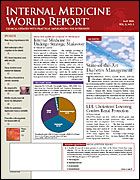Publication
Article
Internal Medicine World Report
Fiber-Rich Diet Curbs Development of Diabetes in Overweight Persons
Author(s):
Diabetes Care
The growing rate of diabetes in the US population has been linked to the increasing numbers of Americans who are becoming overweight or obese. Now results of a new study show that eating foods that contain insoluble fiber may prevent the onset of type 2 diabetes in individuals who are overweight, investigators report in (2006;29:775-780).
The data show that overweight women who added bread enriched with insoluble fiber to their diet for only 3 days had significantly enhanced insulin sensitivity. Insulin sensitivity typically declines before the onset of diabetes. Notably, consumption of 31.2 g/day of insoluble fiber by study patients was within the recommended daily range of 20 to 35 g/day.
“By favorably influencing whole-body insulin sensitivity, intake of insoluble fiber by quantity could be underrepresented in current dietary recommendations,” Martin O. Weickert, MD, general internal medicine, German Institute of Human Nutrition in Nuthetal, Germany, and colleagues write. “An emphasis on cereal, fruit, and vegetable consumption containing a particularly high proportion of insoluble dietary fiber might be a safe, effective, and low-cost approach to reduce insulin resistance.”
Included were 17 overweight or obese women with normal glucose metabolism who were randomized to consume 9 macronutrient-matched portions of fiber-enriched bread or control bread (standard white bread) over the course of 3 days.
Although cereal fiber intake has been linked to a decreased risk of type 2 diabetes in population studies, the “pathogenic background” that might explain this link has not been identified, the investigators note.
These same investigators recently demonstrated that intake of insoluble oat or wheat fibers over a 24-hour period improved postprandial glucose and insulin responses after eating a control meal. Because of the study design, however, it was not possible to demonstrate any improvement in insulin sensitivity related to fiber intake in that study.
In this new trial, the effects of insoluble cereal fiber intake on insulin sensitivity were assessed using the euglycemic-hyperinsulinemic clamp.
Intake of fiber-enriched bread significantly benefitted whole-body glucose disposal to a degree that was equivalent to an 8% improvement in insulin sensitivity.
The use of fiber supplements as a component of dietary recommendations has been challenged, but the gap between the recommended daily intake of 20 to 35 g total fiber versus the actual consumption of <15 g/day underscores the importance of identifying some “active substances of dietary fibers that might have favorable health effects,” they wrote.
The investigators conclude that a high-fiber diet may be particularly prudent in overweight and obese patients who are at increased risk for type 2 diabetes. Whether or not it has a role in other groups, such as men and individuals with marked insulin resistance (including those with established type 2 diabetes), requires additional research.





